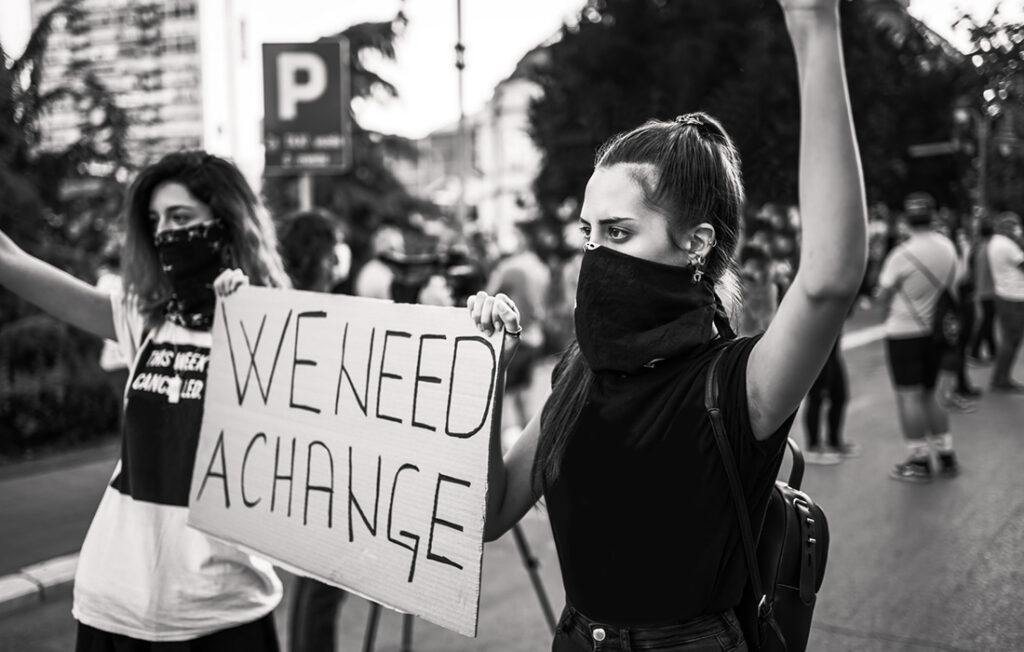
The UN reports a sharp global increase of violence against women and girls since Covid-19.

Photo by: Canva
The virus we don’t talk about - Sweden’s Shadow Pandemic
By Maike Hansen and Elena Wasserzier. – Amnesty International Malmö University
Published 19 May 2021
Throughout the last fourteen months you have heard about, read, and seen news and content addressing the global Covid-19 pandemic. In reference to March 2021, the month of celebrating Women’s history and International Women’s Day – we will take the opportunity to talk about another public health issue that deserves our attention.
According to the United Nations, we have witnessed a sharp increase of violence against women and girls on a global scale since the pandemic has started. Due to drastic lockdown measures and restrictions, people were forced to stay at home, some locked in with violent abusers and unable to access support structures. Levels of domestic violence have a tendency to spike when households experience pressure related to insecurities in financial, security and health domains in addition to living conditions that do not allow for enough personal space. This pandemic, currently taking place behind closed doors, was termed ‘shadow pandemic’ by the UN in 2020.
Although most Covid measures were voluntary in Sweden, the pandemic has left its mark. The Google Mobility report shows that people increasingly stayed at and worked from home, while visiting recreational areas less. The unemployment rate also augmented significantly. So how has the shadow pandemic manifested itself in Sweden? To get more information about this we have talked to Karin Sandell, the head of information at the National Centre for Knowledge on Men’s Violence Against Women (NCK). NCK is a government-commissioned research institution in charge of ‘Kvinnofridslinjen’, the Swedish national helpline for women affected by physical, psychological and sexual violence. NCK was able to give us an overview of their recent monitoring and observations in regard to the shadow pandemic in Sweden.
Surprisingly, the national helpline did not experience a significant increase of calls since March 2020:
We were prepared that the calls could rise, because of an increase of violence, but we were also prepared that the number of calls might go down because it is more difficult to call when you are at home with a [violent] man. So we were prepared that it could go both ways – and it did neither. It stayed the same throughout the year.”
While some women shelters experienced an increase other shelters did not, leading to the concern that women might be prohibited from seeking support in the shelters. However, no supporting data is available yet. Although there is no concrete evidence at this point that violence against women has elevated, NCK assumes that there is in fact an increase:
We do not have the facts and figures to say exactly how it has affected the women. But what we know from the calls is that there is a big need for help.” NCK is currently waiting for accurate statistics from the criminal statistics bureau. What the statistics will not show however, are the dark figures: “most women do not seek help, they do not tell anyone. They don’t go to the police and they don’t call Kvinnofridslinjen or any other helpline either, so it is so difficult to know for sure how it has been.”
Due to isolation, many women are likely inhibited to reach out, when living at home with a violent partner. NCK assumes that more women will call the helpline to seek support once the pandemic has passed, as similar tendencies were monitored after regular holidays:
Many women wait until the isolation is over. For example, we see after holidays; after Christmas, after Easter breaks, we often have more calls. Because often you can stand it for some time but then when you are back at work and everyday life it is easier to seek help again. So that is what we expect – when life goes back to more normal, we expect to see a rise in the need for help, that more women will seek help.“
Sandell further emphasized that violence against women is an urgent issue in Sweden, with or without the pandemic. Sweden is notoriously perceived and advertised as a role model of gender equality globally, but much work remains to be done. According to Sweden’s public health agency, almost every second woman (42 percent) in Sweden has experienced sexual harassment and more than every third woman (39 percent) has been subjected to sexual assault. Hereby, LGBTQ+ persons tend to be more victimized than the general population.
We have seen a change in attitude, especially since 2017, and the #Metoo movement was very important in Sweden, to open eyes that even though we have achieved a lot of gender equality, we still have a big problem with the violence that is widespread. It has changed the attitude, it is much more common now, and I think that is an important reason why we have more calls to Kvinnofridslinjen”, says Sandell.
NCK has witnessed a steady increase in calls since 2017, reaching a total of 46,000 calls in 2020. Although the awareness within the population is growing, the Council of Europe formulated a report in 2019, sharply criticising aspects of Sweden’s work against gender-based and domestic violence. These include the “insufficient resources for the investigation and prosecution of such crimes”, as well as the circumstance that “particularly women from national minorities, such as Sami and Roma, migrant women, and women with disabilities face difficulties in finding support and protection from such violence”.
Especially in a country like Sweden, regarded as a paragon of gender equality, it is important to remember that the reality of gender inequality affects, harms, and kills millions of women and gender minorities around the world on a daily basis. We need to pay attention to the manifestations of inequality that are still taking place – by treating every crisis like a crisis- and strengthen the protection of women’s and LGBTQ+ persons’ rights.
So what can be done in order to help women in violent relationships and to offer support? In that regard, Sandell had several things to say. She urged that it is important to break and avoid isolation by keeping close contact with friends and colleagues. Moreover, to always ask questions about violence in healthcare and social services. But not only in the worksphere, also within friendships, questions about violence should not be stigmatized but rather be posed to remove shame around the topic. Sandell mentioned that NCK´s webcourse developed with the National Board of Health, has received an enhancement in the last year and many more professionals (e.g. police) were engaging in the content and the education. The media has also played a huge role in spreading awareness about the shadow pandemic in news and magazines. Sandell encourages individuals to educate themselves and spread the knowledge:
Knowledge is the key to battle violence”.
In case you, a friend, colleague, relative or acquaintance are experiencing violence at home, please call Kvinnofridslinjen, the national helpline of NCK and talk to someone:
Number: 020-50 50 50
(only available in Sweden, free of charge and available 24h a day)


